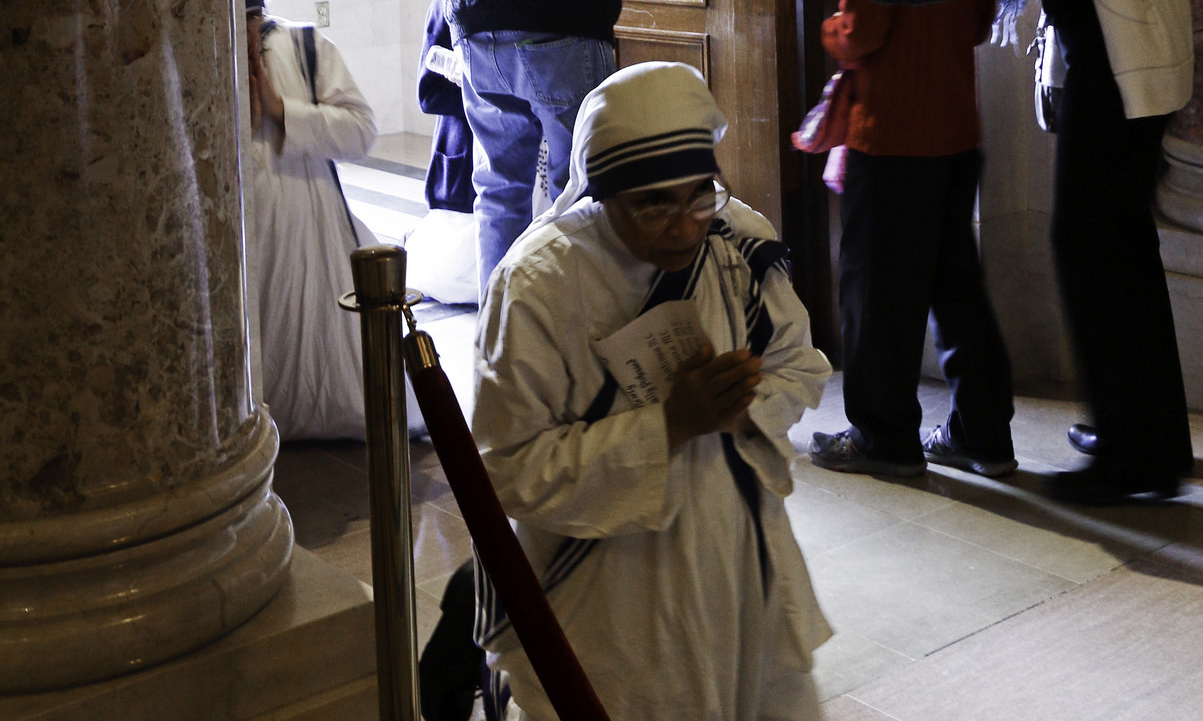Walking the streets of Lower Manhattan with the Missionaries of Charity is not on the top ten list of activities for tourists, but this is how I have been blessed to experience the city in my summer ministry assignment. As we walk, we certainly can see the smartphones, the advertisements, and the tourists taking photos. The sisters, however, have their eyes on a building that no one is taking photos of. They enter the door that everyone else walks past: that of a run-down building that some of the poorest of the poor in Manhattan call home. The scents and visual stimuli from the flashy stores cease, and repulsive sights and smells begin as you enter and start distributing food to the residents.
In a city of commercialism that boasts of its safety and cleanliness, how can there be such poverty? One’s initial reaction to this question might be one of anger and a sense of hopelessness with the world in which we live. After all, how can a society that takes pride in equality and love be so content with turning a blind eye to the basic needs of others? This mentality may lead to a personal endeavor to eliminate poverty once and for all. Despair will set in, however, when the impossibility of this task is realized. One might even begin to question the point of trying to help a system that seems unfixable.
Is this, however, the Christian approach to helping the poor? Pope Benedict XVI took up this question in his first encyclical, Deus Caritas Est. He begins his answer with the Church’s three-fold responsibility of “proclaiming the word of God (kerygma-martyria), celebrating the sacraments (leitourgia), and exercising the ministry of charity (diakonia)” (§25). He then immediately notes that the works of charity are “not a kind of welfare activity which could equally well be left to others.” While providing the poor with the necessities of life, the Christian is also charged with bringing the love of Christ. Only the Christian is capable of this because, in order to share something, you must first encounter it.
With this same spirit Blessed Teresa of Calcutta said, “Money is not enough. Money can be got, but they need your hearts to love them. So, spread your love everywhere you go.” Our mission cannot simply be to develop a social program. Rather, we must point to the dignity of each person: to show them that they are not forgotten, but loved by Christ Himself.
If it were our calling to eliminate poverty altogether, then we should be discouraged. But fortunately that is not our task. Nor is it our task to fully grasp how poverty could exist in such a well-off society. Rather, we are asked simply to identify such suffering and to respond with the love of Christ.
It is liberating when we realize the true nature of the task. There is a freedom in struggling with the presence of poverty, doing what we can, and, as children of faith, entrusting the rest to divine providence. As Pope Benedict wrote, “It is God who governs the world, not we. We offer him our service only to the extent that we can, and for as long as he grants” (Deus Caritas Est, §36).
For Christians, it’s not a matter of saving the world ourselves. Rather, with knowledge of God’s goodness and trust in his providence, we go out into an unfair world to serve the poor, bringing them the love of Christ, the true Savior of the world.
✠
Image: Servant of God Dorothy Day and Blessed Teresa of Calcutta, 1979 (Bill Barrett, Marquette University Archives)







